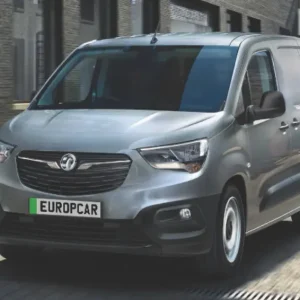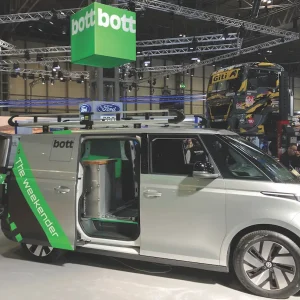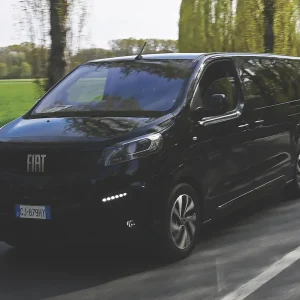In an overall light commercial vehicle market that declined last year, Fiat Professional steered a steady course by increasing its sales by 6.5% to 10,844 units, according to the Society of Motor Manufacturers and Traders.
This gave the brand a market share of 3% and consolidated its position as the ninth biggest-selling manufacturer in the UK.
Fiat Professional has now developed its most comprehensive model range, with contenders in all the main market sectors, but the member of its line-up that has most consistently impressed What Van? is the Doblo Cargo, which at the What Van? Awards 2018 was crowned the Light Van of the Year for the third year in a row.
The Doblo Cargo boasts first-rate handling and comfort, largely thanks to its unique-in-class bi-link independent rear suspension, and bulletproof build quality that has stood the test of time – it received a makeover in 2015 when it became the first model in the line-up to wear the Fiat Professional badge.
Customers are offered plenty of choice. The range features two roof heights and two wheelbase lengths, delivering load area volumes of 3.4m3, 4.0m3, 4.2m3 and 5.0m3.
Gross payload capacities extend from 750kg to 1,005kg. A dropside pick-up derivative, called the Work Up, is also available.
Three impressive Multijet II Euro6 diesels are available with the Doblo. The 1.3-litre produces 95hp while the 1.6-litre cranks out 105hp or 120hp. A 95hp 1.4-litre petrol power plant is also offered and may become more appealing to operators as anti-diesel sentiment grows.
Richard Chamberlain, Fiat Professional’s UK boss, acknowledges the boost the Doblo’s continuing success at the awards gives the van and the people behind it.
“It can only benefit the Doblo Cargo. It’s important to get recognition in the industry,” he says. “It recognises the product’s capabilities and is motivational for the team.”
Chamberlain could not reveal when a new-generation Doblo Cargo would arrive but insists the current model remains ahead of the game in terms of its load-carrying ability, even if the level of technology installed in new vans has inevitably moved on since its launch.
He claims the only way customers can find an alternative to match the Doblo Cargo’s maximum payload and load volume offerings is by moving up to a medium van, which means paying more money.
Chamberlain adds that as a light van the Doblo Cargo also offers a lower ride height and better fuel economy than models in the class above.
While he acknowledges that within the Fiat Professional range there is some overlap between the Doblo Cargo and the Talento medium van, which is built on the Renault Trafic platform, he insists that this is worth it in order to provide customers with more choice.
The Doblo Cargo currently shares its facility in Tofas, Turkey, with the Vauxhall/Opel Combo, but this arrangement will come to an end within a year, with the next-generation Combo to share a platform with PSA’s light vans – the Citroen Berlingo and Peugeot Partner.
Chamberlain claims Fiat does not necessarily need to replace the Combo on the assembly line.
“The Doblo is produced in a flexible facility in Turkey. When we lose the Combo we don’t need another partner from a production perspective.”
The Talento represents a big step up for Fiat Professional in the mid-sized van segment in terms of quality and practicality compared to its predecessor, the Scudo, but it faces stiff competition in the most fiercely contested sector of the market. Chamberlain claims that while the van enabled Fiat to fill a gap in a key market, its aspirations for the model are modest.
“We never set out to dominate the market,” he says. “It’s important to offer a capability but we don’t want to over-extend ourselves with volume.”
Chamberlain claims that, as the newest of the products based on the Renault Trafic (it came to market in mid-2016), customers say it “looks better than its sister vehicles – less dated”.
The Fiorino, a previous winner of the Small Van of the Year Award, was Highly Commended this time. It sits in a niche sector – as a compact cubed van in the UK it has only the Ford Transit Courier for company as a truly like-for-like rival, with the Fiorino-based Citroen Nemo and Peugeot Bipper having departed the scene and the Vauxhall Corsavan being a different proposition as the last car-derived van still standing.

Fiat Professional UK boss Richard Chamberlain
Chamberlain insists the Fiorino is “still doing well for us”, and points out it commands bigger shares of the markets in France and southern European countries.
He also says that, along with the Doblo Cargo, it will attract interest with a petrol engine.
“People are wanting an alternative to diesel,” Chamberlain states, before hastening to add:
“[But] there is still a big role for diesel in commercial vehicles.”
He contends that the market still doesn’t recognise electric powertrains as a viable alternative for CVs and points out that the latest Euro6 diesel engines have significantly reduced CO2 and NOx emissions.
Chamberlain stresses the need to “look at the whole journey” when it comes to EVs, pointing out that the production of electricity can itself have an environmental impact in some regions, but says the Fiat Group is likely to reveal its plans for the alternative fuel later in 2018.
From an economical perspective, Chamberlain concludes: “We firmly believe diesel is the solution in the medium term.”
Fiat used last year’s CV Show to demonstrate the versatility of its Ducato large van with a low-floor Luton conversion, an ambulance and a pod box that fits onto a Ducato chassis.
The brand also displayed its limited-edition Fullback X pick-up truck at the NEC. Chamberlain says the Fullback is predominantly appealing to lifestyle customers and adds the model notched up a respectable 1,000 sales in its first full year on the market.
He stresses that changes to the currently favourable fixed benefit-in-kind (BIK) rates and VAT arrangements could knock the bottom out of the buoyant pick-up market.
Pointing out that many fleets work to a five- to seven-year lifespan for their vehicles he cautions the Government to be very clear about any changes to tax laws.
“Changes in regulation can destroy markets very quickly,” he warns.
Looking at prospects for Fiat Professional’s range in 2018, Chamberlain does not anticipate much change from last year.
“Overall it will be similar to 2017,” he predicts. “It will soften with Brexit, but not significantly.”
The Ducato remains Fiat Professional’s biggest volume player by a clear distance – last year it accounted for 7,000 sales compared to the 2,500 of the Doblo Cargo in second place.
Fiat Professional has 70 sales and 150 aftersales points in the UK and Chamberlain says the Ducato is well served by the extended opening hours the brand can offer operators at 35 dealers through its corporate links with Fiat Group truck manufacturers DAF and Iveco.
He says the bland of HGV and car dealers within the network “supports customers at whatever end of the spectrum [they are on]”.
Chamberlain admits that historically Fiat’s light commercial vehicle division has concentrated on large corporate and short-term rental deals but claims the focus is now on small and medium-sized enterprises.
“This is important for the dealer network,” he says.
With a dedicated fleet team to drive the process, he adds: “There has been a move into smaller, regional fleets.”
The aim is to achieve more volume through more customers, with increased emphasis on conversions with greater brand awareness and stronger residual values as a result.
Chamberlain became Fiat Professional’s fourth boss in a period of just two years when he took the helm 12 months ago, having joined the brand in October 2016 from Renault Trucks, but he promises he is in it for the long haul.
“I’ve no plans on going anywhere else,” he says. “My experience and passion is for commercial vehicles.”






